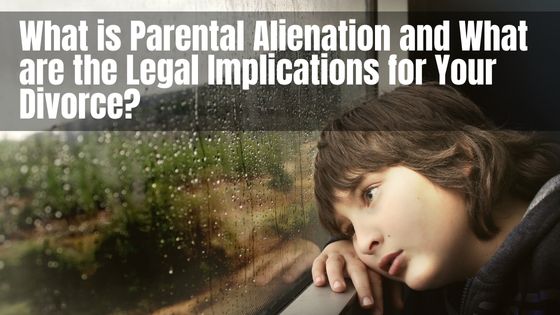Parental alienation is a legal term that describes a condition where one parent undermines, degrades, and damages the other parent’s relationship with one’s child or children. Children will feel especially vulnerable during a separation or divorce, and relationships with parents can get strained. The experience can be traumatic for some children, which one parent can take advantage of during divorce proceedings.
This term is considered controversial in some legal circles, and in some cases, the court may become reluctant to label such behaviors. However, if one parent acts or behaves in such a manner, it’s crucial to identify and label such actions, especially when parenting proceedings are underway. In cases of parental alienation, it is vital to work with an experienced divorce attorney who can expertly guide you through the litigation process.
Parental Alienation Defined
Parental alienation refers to the actions of one parent geared towards turning their child or children against the other parent. This behavior can cause friction between the parent and the child and often results in both parents competing for the child’s affection.
Giving nasty comments, becoming manipulative, and making false accusations fall into this category. The goal of this behavior is to influence the child to have bad feelings and emotions, induce hate, and eventually refuse to spend time with the other parent.
The strain in the parent-child relationship can cause hostility and, in some cases, make the alienated parent break down. The impact is even more severe for the child since it may cause issues in the child’s psychological development. The courts can also acknowledge that either parent has the potential to alienate the other, regardless of gender, which can destroy the bond between parent and child.
If one party engages in parental alienation, working with family law experts is crucial. An experienced divorce attorney can help you identify and gather evidence of such an unjustified denigrative campaign.
Proving Parental Alienation
A divorce attorney specializing in family law can help you secure your rights as a parent. It can be hard to prove that one parent alienates the other through negative feedback in the child’s presence. One of the best approaches to prove your case is demonstrating how this negative behavior already harms the child.
Your lawyer will try to prove the symptoms of parental alienation syndrome, which is one of the most prominent approaches. This approach aims to demonstrate to the court that your child has no reason to hate you and that you didn’t do anything wrong, as alleged by the other parent.
Signs and Symptoms to Highlight
Your divorce attorney will highlight the symptoms of parental alienation syndrome in your child to help determine the other parent’s hostile actions. Some of the signs that will be brought to light include the following:
- Your former spouse prevented you from talking or even seeing your child.
- The other spouse manipulates and controls how the child communicates. Evidence that can be used to highlight this act includes phone calls, text messages, and other interactions. It is important to note that the child will act differently when the abusive parent is around while the alienated parent tries any form of interaction.
- The other parent undermines or breaks the conditions outlined in the shared parenting plan.
- The other parent isn’t willing to make allowances or arrangements to accommodate healthy interactions of the child with the other parent.
- The other parent plans events with conflicting schedules that prevent the alienated parent from spending time with the child.
- Withholding information about the child also counts as parental alienation. For instance, your ex spouse may not want you to see school reports, medical, or other information that may help you develop and grow your relationship with your child.
The Court’s Views on Parental Alienation
The court will favor and encourage healthy parent-child interactions allowing both parents to have sufficient access to their children. In these cases, the courts will tend to strictly monitor both parties involved when it suspects that the relationships between parents and children have become negatively impacted.
The court will always consider the well-being of the child, and this will be the priority in these proceedings. Certain aspects of the relationships involved will be accounted for, including the following:
- The capacity of each parent to provide meaningful and sufficient care for the child.
- The child’s risk of exposure to any form of physical, emotional, or psychological harm.
- The court will also try to ascertain the child’s feelings, wishes, and thoughts.
The court will focus on what drives the child’s feelings and actions towards both parents. Your lawyer will provide documented evidence to prove your case and demonstrate parental alienation.
Work with a Seasoned Divorce Attorney
The goal of any litigation involving parental alienation is to secure the welfare of the child. However, alienated parents must take swift action when they see the first signs. An experienced divorce lawyer will help you document evidence during your interactions to prove your case.
To learn more about your options, contact the Law Offices of David Kohm today at any of our convenient locations and get a free consultation.
Arlington (817) 522-4451
Dallas (972) 362-6848
Fort Worth (817) 764-1375
Plano (972) 354-4602
Cedar Hill (972) 338-9427
McKinney (469) 522-3688
Lewisville (972) 354-4605
Frisco (972) 725-7681
Grapevine (817) 835-8677
Irving (972) 354-4610
Keller (817) 204-0904
Garland (214) 572-2251
Denton (940) 222-4060
Addison (972) 564-8108
You can also contact us online by using our contact form.











